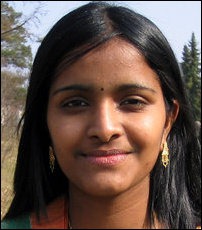The Swiss branch of the Society for Threatened Peoples (GfbV), a human rights organisation that speaks up for voiceless peoples and communities, has come forward to act as an independent custodian of evidence material and in working out submissions on behalf of individuals and organisations, who need assistance in making submissions to the UN Panel, Tharsika Pakeerathan, the president of Swiss Council of Eelam Tamils (SCET), told TamilNet Wednesday. The GfbV will begin by conducting interviews on 28 November, 2010 in Bern, aiming for submission to UN Panel before 15 December.

Tharsika Pakeerathan
The main concern of the SCET in entrusting the GfbV on the task is that crucial evidence material must be registered in a credible way and preserved in safe lockers by an independent institution, which is neither involved in international power politics nor in Tamil lobbying, Ms. Tharsika said further.
A main advantage of preserving the evidence material, independent of UN mechanism, is that even the other independent national, regional or global investigation mechanisms could make use of the evidence material in future, according to the SCET president.
Tharsika urged those interested in giving evidence to contact the GfbV by e-mail (in German, English or French) to [email protected] or those who wish to communicate using Tamil to phone number +41 78 744 59 60.
The SCET, in collaboration with the US based NGO Tamils Against Genocide and Norwegian Council of Eelam Tamils, has filed a case at the European Court of Human Rights (ECHR) in July charging the German government for violating EU Rights conventions by accepting a Sri Lankan military commander Maj. Gen. Jagath Dias alleged of war crimes as Sri Lanka’s diplomat to Germany. The European Court has accepted the case for investigations.
"While suing those responsible for war crimes and genocide in our homeland, we will also resist any attempt by the Sri Lankan state that seeks to make the Tamil diaspora a threatened people in our host countries," Tharsika said adding that a broader legal project is being undertaken in Switzerland to evaluate the possibilities of taking actors of the war crimes to the courts in Switzerland and Germany, to prepare dossiers on those actors who might visit these countries, to prepare the complaint procedures, to clarify the questions of immunity, and to prepare the communication strategy.
Articles 6, 7 and 8 of the Rome Statute of the International Criminal Court describe the offences of genocide, crimes against humanity and war crimes.
“Since these articles represent customary international law their content is applicable to all states, regardless whether the states did or did not ratify the Rome Statute,” Tharsika said citing a document from the GfbV.
Since the Sri Lankan government will not accept the demand for international investigations quickly, responsible actors shall be persecuted in countries that have ratified the Rome Statute and have enacted legislation allowing for universal jurisdiction over these crimes.
“Other than Sri Lanka, many countries have ratified the Rome Statute of the International Criminal Court and adapted their national legislation to the international obligations. Switzerland, for example, will enact a new law that enables the Swiss courts to judge cases of genocide, crimes against humanity and war crimes, amongst others, on January 1st 2011. Similarly, Germany ratified the Code of Crimes against International Law (Völkerstrafgesetzbuch) in 2002 to facilitate the implementation of the Rome Statute,” the GfbV document further said.
(For updates you can share with your friends, follow TNN on Facebook and Twitter )
